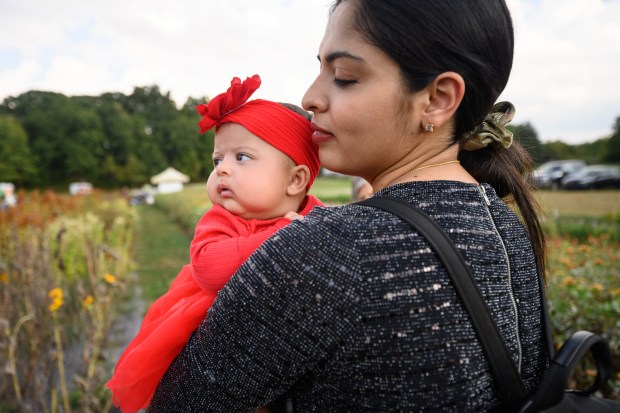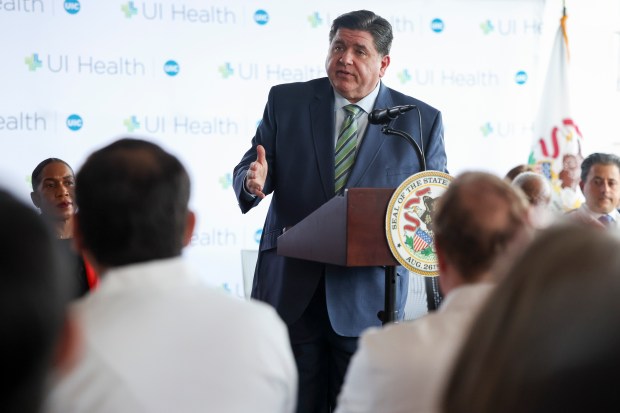The unseasonably warm, dry weather has turned humid and sticky on a Friday afternoon but that does not deter the youngest of children from finding wonder all around them on a flower farm in rural Porter County.
More than 130 varieties of flowers bloom on two acres at Hickory Hills Flower Farm. The day’s earlier clouds have cleared to reveal blue skies and sunlight dapples the rainbow of floral hues, zinnias, dahlias and other brightly colored bouquet favorites.
Butterflies flit from flower to flower, catching the attention of infants and toddlers who coo and stare at this natural world while their moms, sometimes accompanied by their dads, pose for photos and gather blooms for a souvenir bouquet.
This is more than a trip to a flower farm for family photos in the golden, late afternoon sun. It is an opportunity for lower-income pregnant women and mothers of young children to meet with women farmers, learn from and form friendships with women who are going through the same stage in life, and bring home a tote full of seasonal produce, other regionally sourced foodstuff and get recipes and resources for turning those totes into healthy, nutritious meals.
“All this is healing me,” said Yasmin Shaik, 25, of Hammond, who was accompanied by daughter Aiman, 3 months, dressed in a red tutu and a red headband.
Shaik, who came to the United States three years ago from India to pursue a master’s degree in computer science at Western Illinois University, said she suffered from post-partum depression after having Aiman, not helped by her family, including her mother, being so far away.
She said she was “crying all the time” after having Aiman by cesarian section and Maria Zendejas, a registered nurse with Nurse-Family Partnership who accompanied the women to the flower farm, suggested she connect with other moms through FarmHer to Mama.
“She said you have to come out of the house and see other people, moms, and have some friends,” Shaik said, adding she attended a farm event with the program in August.
“I was feeling great after coming out.”
Shaik is one of around 10 women and their families who participated in the Sept. 20 program at Hickory Hills Flower Farm as part of FarmHer to Mama. The program, funded through a grant from the Indiana Department of Health, kicked off in July 2023 and by November, started distributing food totes, according to Becca Tuholski, local food access coordinator with the Northwest Indiana Food Council and co-lead for FarmHer to Mama.
The first distribution included 50 totes, with about 10 pounds of food per container, and some families, depending on their need, get more than one tote each month, Tuholski said. By July, the program distributed 70 totes a month; most of the recipients are from Lake County.
Through the end of September, the program will have distributed 600 food totes, with an average value of $35 to $40 in food.
“That’s at least 6,000 pounds of food and it’s not just produce,” Tuholski said, adding that depending on what’s available, the totes also might include meat, cheese and oats or flour.
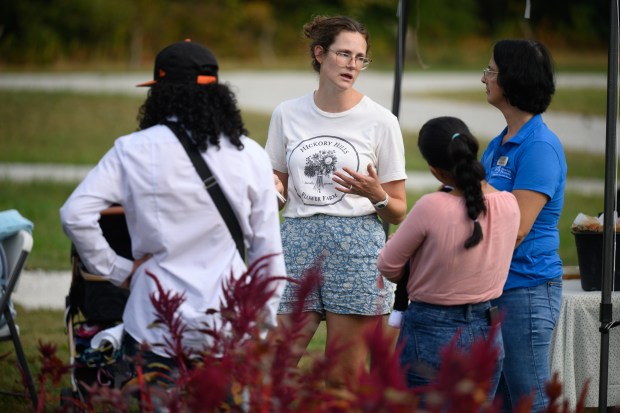
The three-year grant provides a total of $90,000 for food purchases, she said, and the program’s immediate goal is to expand to provide 100 totes a month.
“Ultimately, the food council believes everybody has a right to food and the most critical period to have access to food is (ages) 0 to 5,” Anne Massie, co-executive director of the Northwest Indiana Food Council.
Tuholski points to figures from the 2022 Indiana Department of Health report on infant mortality and birth outcomes to illustrate the importance of nutrition and early prenatal care.
In 2022, 9.3% of the live births in Lake County were considered low-weight, higher than the state average of 8.7%. Porter County fared better, with 6.6% of births considered low-weight, considerably lower than the state average.
As far as prenatal care, 33.7% of pregnant women who had live births in Lake County that year did not receive early prenatal care; the figure for Porter County, at 29.1%, was the same as the state average.
Additionally, according to statistics from Feeding America for the counties served by the Northwest Indiana Food Council, Lake County had an overall food insecurity rate of 14% in 2022, and a 23.3% rate for child food insecurity.
Porter County’s percentages for the same period were 12.3% and 13.6%, respectively.
FarmHer to Mama, Tuholski said, benefits everyone who participates in several ways. Farmers, many of them also moms, get involved in a mission-driven program that can help expand their business. They also can connect with other farmers in the program — there are around 20, mostly in Lake and Porter counties — at events and workshops.
The moms and moms-to-be, she said, receive nutritious, locally-grown food and can meet the farmers who grow it as well as other moms.
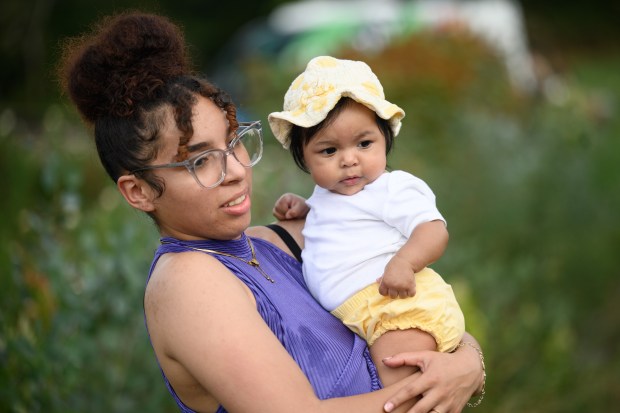
The flower farm visit was Elizabeth Rodriguez’s first real outing with daughter Myrlianis, 5 months, who goes by Lany for short.
“It’s the new scenery. It gets me out of my comfort zone. Lany gets to see new things. I live in the middle of Hammond,” said Rodriguez, 20.
Everything caught Rodriguez’s eye, she said, from the colors of the flowers to the butterflies.
“It’s absolutely beautiful,” she said, as Lany looked around as well.
The program is a partnership between the food council; Nurse-Family Partnership, a program of Goodwill Industries that pairs nurses with pregnant and new moms through two years postpartum; and Purdue Extension Nutrition Education Program, which offers free nutrition classes and cooking resources.
To be eligible for the program, women must be at or below 250% of the federal poverty level, though Tuholski hopes that it will eventually be available to all moms, regardless of income.
The ultimate goal of the program is sustainability beyond the life of the grant, which ends at the end of June 2026. FarHer to Mama officials are already working on what it will take to keep the program going.
“I think it’s a really complex question and one that will take us longer than three years to answer,” Massie said.
She hopes that more families will be able to use federal benefits from the Special Supplemental Nutrition Program for Women, Infants, and Children, commonly known as WIC, as well as the state’s Supplemental Nutrition Assistance Program, or SNAP, and Medicaid, to purchase food through food as medicine programs, which recognize the health benefits of fresh produce.
“This would be considered a food as medicine program,” Tuholski said, adding the food council is looking for state initiatives, partnerships and other opportunities to fund the program when the grant ends.
Rosa Reyes, 28, of Hammond, husband Freddy and son Mateo, 1, posed for photos among the flowers for Valparaiso photographer Amelia Kowalisyn, who toted son Tucker, 7 months, in a carrier strapped to her chest.
Reyes said she heard about the Nurse-Family Partnership through WIC and Zendejas asked her if she was interested in receiving food through FarmHer to Mama.
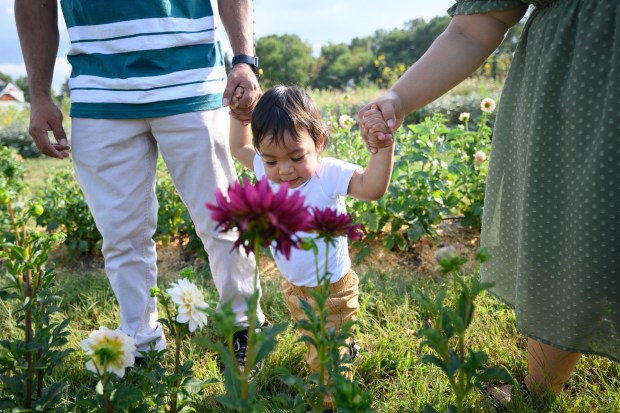
“Especially healthy foods, yes,” Reyes said, adding the totes also include recipe cards, “and they mostly have everything in there (to make meals), which I really like.”
Hickory Hills Flower Farm, Reyes said, was “very nice” and Mateo was enjoying the new environment, too.
“He’s smiling, touching all the flowers,” Reyes said, adding she she just started with FarmHer to Mama and the flower farm was her first event.
“I did talk to some of the moms and soon-to-be moms. They all had the same experience so it’s nice to have that connection as well,” Reyes said, adding she also liked to see Freddy and other dads tag along, “which is very cool.”
Reyes said she didn’t know how else she could have the experience FarmHer to Mama provided, including a trip into the country 45 minutes or so from her urban home.
“We’re right next to Chicago,” she said. “Unless you have some flowers in your garden, you’re not going to see it outside.”
For Amber Thompson, 35, of Schererville, FarmHer to Mama provides a village when she needs one most. In recent months, her husband almost died in a car accident and can’t work because of his injuries, and they lost their home in a fire.
The couple’s first child, a daughter, is due on Dec. 7. Thompson saw flyers about the Nurse-Family Partnership at her doctor’s office and found that her family qualified. She also joined FarmHer to Mama.
“They’ve made sure we keep fresh produce and other things on our table. I don’t have enough ways to thank them. I really don’t,” Thompson said. “It’s absolutely amazing. It makes me feel like I have a community.”
Thompson is the first of her friends to have a baby so the support she’s receiving from other pregnant and new moms is invaluable.
“Gaining a village has been amazing. They are loving and caring and supportive. I can’t say enough good things about this,” she said. “Not all pregnant women get to have that village.”
alavalley@chicagotribune.com


